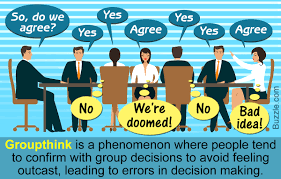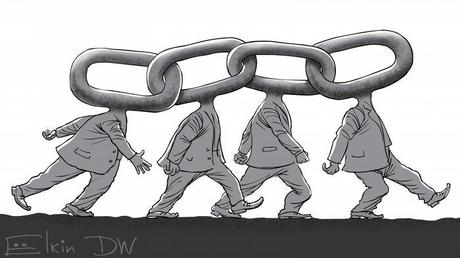When we proposed in the first blog post about coronavirus that the slow reaction and lax attitude of institutions can partly be explained by the phenomenon of groupthink, we could not imagine that later on groupthink would assume an even more dominant role in tackling the crisis.
In the beginning, warnings about an emergent pandemic in Europe and the United States were dismissed as unnecessary sowing panic by “alarmists”, but later on a chief editor of a so-called quality newspaper perfectly illustrated exemplary group thinking by the mainstream media.

¨If a country has entered into a crisis, such as our country with the coronavirus in recent months, then journalism should not be too critical and especially follow the line of the government and the Institute for the control of infectious diseases. You should not provide a podium for virologists who deviate from the “official” line¨.
Read twice. The press that muzzles itself. Quite disconcerting, isn´t it?
What is Groupthink?
Groupthink is a psychological phenomenon that occurs within a group of people in which the desire for harmony or conformity in the group results in an irrational or dysfunctional decision-making outcome. Cohesiveness, or the desire for cohesiveness, in a group may produce a tendency among its members to agree at all costs. This causes the group to minimize conflict and reach a consensus decision without critical evaluation.

Bay of Pigs was a plan that many knew in advance would fail. Yet the American President John F. Kennedy went ahead with the plans to try to invade Cuba despite the fact that several of the generals knew that the plan would backfire.
After the Bay of Pigs invasion fiasco, President John F. Kennedy sought to avoid groupthink during the Cuban Missile Crisis using “vigilant appraisal”. During meetings, he invited outside experts to share their viewpoints and allowed group members to question them carefully.
So far, we have not been able to find any government, health organization, or advisory team in Europe or in the USA that has structurally organized “critical questioning”. That is all the more dangerous because, in a time of crisis, everyone likes to be behind a leader, and as a result of that we forget to be critical and question suggestions and ideas.
The temptation to be docile and to consume dissent is never far away in times of crisis. Important warning signs are framing, putting people away as non-experts, alarmist or populist, and calling for unity. (Which is in our opinion something totally different from finding sound approaches.)
Warning Signs
The docility and self-censorship of the press and politics in times of corona are worrying when journalists and politicians call for part of parliament (especially the opposition) to be put out of order.

Self-censorship is closely intertwined with groupthink, f.i. a positive air ionization recommendation was taken from a site of a national virus control institute, it seems that ionization may suggest that viruses are contained in aerosols, which should not be discussed by the public.
Groupthink by Governments and Health Authorities
The governments and experts in the Advisory Boards have been canonized. Even the press no longer asks critical questions. It is even encouraged. Doubt is deliberately left out of the reports and is therefore factually political and not scientific. The advice of an Outbreak Management Team is non-transparent and uncontrollable and therefore irrefutable. They are not accessible by the law of Freedom of Information. At the same time, how ironically, politics run away from responsibility and hide behind experts. Politicians like to hide behind “Science” as if it had a concrete position.
¨It is important that we stick to our leaders’ chosen strategy something that gives us a sense of peace and security¨.
A Professor of International Relations and chairman of a National Security Think Tank: ¨As the entire House of Representatives, we must follow what the cabinet is doing and fully support them in this. We must join the leader even if they do not share his political opinion or his approach¨.

An employee of a National Institute for Virus Control was told by his colleagues not to express his opinions too openly about a certain suggested policy. In doing so, he would only undermine the authority of the national institute.
“There is too little breadth in the social debate. My wife, who is a general practitioner, had practice yesterday and she said that it is extremely difficult to refer people with conditions other than corona. A lot of ordinary health care does not work now. That is dramatic and there is a responsibility for our government that is separate from virology.”.
Some administrators very explicitly pursue the image of forceful leadership: Demand unity, want to come across forcefully, prefer not to hear criticism, leave out unwelcome information, and try to push through uniformity of policy.
In a case filed against unconstitutional measures against the coronavirus, the state lawyer argued: “It was the right approach” without indicating how this “good approach” was tested.
Next posts
In the following posts, we will discuss groupthink by experts and advisory boards, as well as by the Main Stream Media.

Related posts
- The Social Dynamics of Thinking. Some groundbreaking research has shown that group dynamics have a profound and often destructive influence on individual thinking. The question arises whether the social environment can be changed to improve thinking. A question for social design?
- Detrimental Social Agreements. You are not allowed to dissent, because that is ¨not responsible¨ and hinders arriving at a ¨joint solution¨. It would mean that you are not ¨united¨ and have notwithstanding that difference in opinions and interests? That is not ¨responsible¨. Who decides what will be fair in a situation defined as ¨through thick and thin united¨? Who is ¨We¨? Would you accept this?
- Group Obedience. Basically, it is not the best strategy to strive for consensus, but for dissent. So encourage disagreement, a difference of opinion, argument, dispute, disapproval, objection, and protest over constructing consent and majority rule.
- Remedies Against Groupthink. There are a number of answers for groupthink which boils down to organizing criticism from outsiders. But taken to extremes, criticism, debate, and argument prevents the creative design of solutions. One answer to overcoming the limitations of traditional dialectic thinking is the Six Thinking Hats method, designed by Edward de Bono. It describes the advantages of parallel thinking. The Six Thinking Hats method was developed around 1982. The Six Thinking Hats has been used worldwide with success by many diverse groups – large corporations and small primary schools, by government juries and activists.
- Distorted Logic Bubbles. Roxburgh mentions eight flaws he derives from behavioral economics which studies the effects of social, cognitive, and emotional factors on the economic decisions of individuals and institutions as opposed to the paradigm that humans make economic decisions rationally.
- How to hack assumptions. A major obstacle that prevents us from recognizing assumptions is social rejection. By not thinking within the boundary conditions of logic and the unconscious commonly shared tacit presuppositions you violate a social norm.
- Observe The Thinking – Use Thinking Vocabulary. We have nowhere came across in newspapers or commentaries on TV the use of concepts that describe the thinking or the use of some kind of a “thinking vocabulary”.
- Dramatized Thinking Vocabulary – How to Make Sense of the World. In this post, we will explore the theme of conformity and social dynamics in a more dramatic and impact-full way, mentioning the books and movies you must know if you want to defend yourself against manipulation.
- Press Patterns. Often there is a silent coalition between politicians and media reporters. In exchange for providing news, a scoop, or granting an interview, a journalist will write “friendly” (non-critical) about the politician. Journalists are in competition with each other for access to news sources, reputation, scoops, and jobs. A deadly embrace with those in power. At the same time, politicians are dependent on journalists to get heard by their voters. They are in competition for media attention, mainly with their party colleagues.
- Framing – to lure into deception. Most of the time framing is a technique used by politicians or their advisers to favor a wished representation of the facts, usually when things went wrong. The reproduction of political framing is usually a conscious choice by journalists – in this case, a frame refers to the way media as gatekeepers organize and present the ideas, events, and topics they cover.
